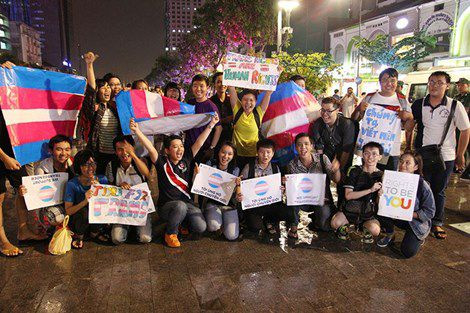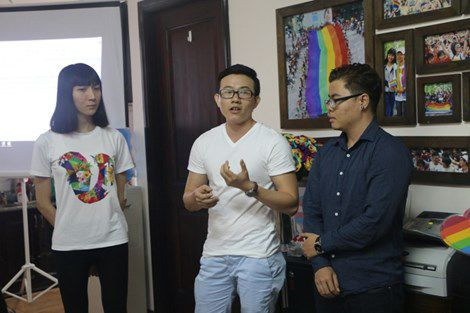10 things to know about transgender legalization in Vietnam
The Vietnamese National Assembly has officially recognized the right to gender reassignment and the Civil Code (amended) will officially take effect from January 1, 2017. This is an important step forward in affirming the rights of transgender people.
Below are 10 things you need to know about the legalization of transgender in Vietnam, compiled and provided by the iSEE Institute for Social, Economic and Environmental Studies.
1. So right now, I can get surgery or change my gender on paper?
Not yet. The new Civil Code will take effect from January 1, 2017 (that is, more than 12 months from now). This period is for preparation before the unified application, because this is a massive law with many contents. From now until December 31, 2016, the current Civil Code of 2005 will still be in effect.
2. On January 1, 2017, can I have sex reassignment surgery and change my gender on paper?
Maybe. Because the new regulation states “Gender reassignment is carried out in accordance with the provisions of law”, it means that there will have to be a law on gender reassignment issued to specify the conditions, procedures, processes, or guiding documents for implementation. The official time when transgender people can exercise their rights will be stipulated in that specialized law.
Transgender people have had their rights recognized and the goal is not to let this right be “suspended”. Minister of Justice Ha Hung Cuong also stated after the passing of the Law: “In July 2016, the 14th National Assembly will meet to discuss the law-making program. Certainly, if the specialized ministry does not propose, the Ministry of Justice will also propose to develop a law on gender reassignment”.
 |
| The LGBT community in Saigon braved the rain to celebrate "Thank you National Assembly" on the evening of November 24. Photo: Hoang Giang. |
3. Who can have a sex change?
The new Civil Code has two separate articles. Gender reassignment (Article 36) and gender reassignment (Article 37). Gender reassignment applies to people who are not clearly male or female at birth, while gender reassignment applies to those who wish to change their innate gender. Thus, basically anyone who has the need can undergo gender reassignment.
4. Am I allowed to have surgery in Vietnam?
Yes. Sex reassignment surgery has been banned in Vietnam, so transgender people have to go to Thailand or other countries for surgery. With the new regulation “Sex reassignment is carried out in accordance with the law”, it means that citizens have the right to change their sex in Vietnam.
5. After surgery, am I allowed to change my gender on paper?
Yes. With the new regulation, “individuals who have undergone gender reassignment have the right and obligation to register changes in their household registration according to the provisions of the law on household registration”, which means that after surgery, transgender people can register to change their name and gender.
6. I have not had gender reassignment surgery, can I change my gender on paper?
No. According to the new regulations, registration of changes to civil status documents only applies to people who have undergone gender reassignment surgery, although the trend in the world is to change the gender of documents regardless of whether or not they have undergone surgery.
7. I only had partial surgery (breasts, hormones). Can I change my gender on paper?
Not clear. According to the new regulations, it is not clear what is considered “transgendered”, whether completely or partially. The trend in the world is that only a psychological certificate of gender and continuous use of hormones for at least 12 months is required to change gender on paper.
 |
| Transgender people openly in Ho Chi Minh City share their concerns on the afternoon of November 27_Photo: Nguyen Tra. |
8. Are medical facilities in Vietnam capable of performing gender reassignment surgery?
Yes. The Vietnam Pediatric Surgery Association has affirmed that Vietnam has the capacity to perform gender reassignment surgery. And in fact, it has been performing surgery on cases where the congenital gender is unclear, male or female.
9. Am I allowed to get married to someone of the same sex?
No. The Civil Code only provides general provisions on the marriage and family regime. Detailed regulations are contained in the Law on Marriage and Family (L&F). In 2014, Vietnam passed a new L&F, according to which same-sex marriage is no longer illegal but is not yet recognized and enforced.
10. If I have had surgery and changed my gender on paper, am I allowed to marry my lover who is now the opposite sex on paper?
Yes. Currently, because it is not possible to change the gender on paper, transgender people and their partners are usually considered by law to be two people of the same sex, and therefore cannot marry each other. Under the new regulation, “Individuals who have undergone gender reassignment […] have the personal rights appropriate to their transformed gender”, meaning they will have the rights and obligations appropriate to their new gender, including the right to marry someone of the opposite sex.
According to Online Law
| RELATED NEWS |
|---|





